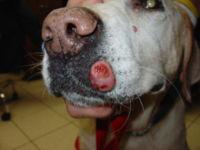Big News in Cancer Treatment for Dogs!

Big News in Cancer Treatment for Dogs!
Just last month, veterinary oncology had a first and as a board certified veterinary oncologist, this news just made my day. Until now, all chemotherapy agents administered to dogs were human drugs adapted for use by veterinarians. In June, the Food and Drug Administration’s Center for Veterinary Medicine approved the use of Palladia® (toceranib phosphate) which was specifically developed for use in dogs and has safety and efficacy data from canine studies backing its use. Palladia is licensed for the treatment of recurrent mast cell tumors. Veterinary oncologists have effective therapies for some dogs with mast cell tumors. These treatments include surgery, human chemotherapy agents and radiation therapy. But not all dogs have tumors amenable to surgical removal, not all tumors are in a location where radiation therapy can be safely administered and currently available chemotherapy agents do not cure every dog. So the first drug specifically developed for canine mast cell tumors is big news. Mast cell tumors are one of the most common skin tumors in dogs and are one of the most important cancers veterinary oncologists treat. Some dogs are unlucky enough to have multiple mast cell tumors or a mast cell tumor that keeps coming back in the same location. So a drug to help manage this common tumor is big news, redux. Palladia belongs to a class of drugs known as tyrosine kinase inhibitors. The presence of abnormal tyrosine kinases in tumors results in the proliferation of tumor cells and the growth of new blood vessels to the tumor. These blood vessels provide nutrients to the growing tumor. Inhibition of tyrosine kinases by drugs like Pallada (or for humans, Gleevec®, another tyrosine kinase inhibitor) stops both cell proliferation and new blood vessel growth. Without nutrients and without cell proliferation the tumor shrinks. More big news. Pfizer Animal Health is working with veterinary specialists to help them use Palladia effectively and safely. It is currently available from board certified veterinary specialists in oncology, internal medicine and dermatology. To find the specialist nearest you go to https://www.acvim.org/ for oncologists and internists and at https://www.acvd.org/ for dermatologists. Pricing for Palladia has not yet been announced. Click here to download an information sheet about Palladia from The AMC.
The Oncology Team at The Animal Medical Center At The Animal Medical Center, specialists certified by the American College of Veterinary Internal Medicine in the sub-specialty of Oncology and the American College of Veterinary Radiology in the sub-specialty of Radiation Oncology provide dedicated care for pets with cancer Monday through Saturday. We take a team approach to cancer care, collaborating with specialists in the fields of diagnostic imaging, pathology, surgery and internal medicine to create a customized plan for the care of your pets.


































